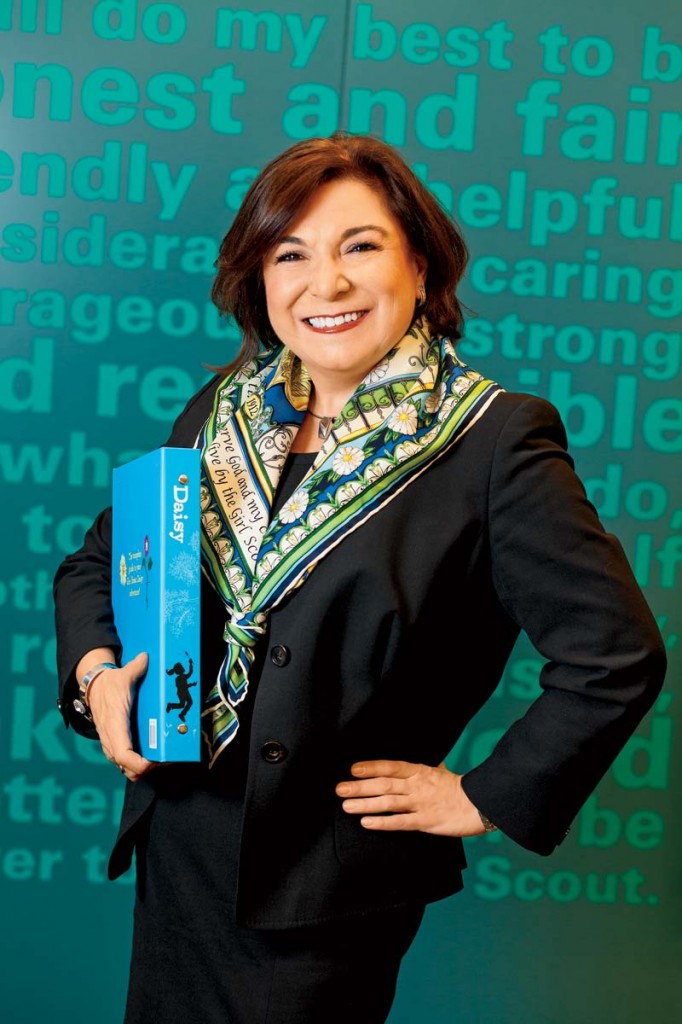Business Profile | Maria Wynne
By Mark Zonca
May 2013 View more Business
CEO of Girl Scouts of Greater Chicago and Northwest Indiana
Preparing girls for future leadership roles and responsibilities. That’s been the long-standing goal of the Girl Scouts. Now more than ever, the Girl Scouts is fine-tuning and refocusing its attention on that mission. Naperville Magazine recently spoke with Maria Wynne, CEO for the Girl Scouts of Greater Chicago and Northwest Indiana, about the changing role of the organization and her plans for the future.
You were appointed CEO of the Girl Scouts of Greater Chicago and Northwest Indiana in 2008, the largest Girl Scouts council in the country. What has been your proudest accomplishment so far?
I have made investing in girls a priority and have connected that to the urgent need for mentoring that needs to take place to prepare girls for the jobs that will be available in their adulthood. Today, the U.S. economy faces a workforce skills gap in the critical areas of science, technology, engineering and math (STEM). Typically, these are areas that lack women with relevant skills. We know, based on research conducted by the Girl Scout Research Institute, that girls are interested in these disciplines, but lose interest early due to the introduction of gender bias, lack of mentoring and lack of role models. Since 2008, we have invested in STEM programming, and we are seeing results. Our LEGO Robotics leagues now have waiting lists. Girls who have been involved in robotics are seeing a link to academic performance and are striving to pursue college careers in those fields.
When you were first appointed CEO, you led an unprecedented merger of seven independent Girl Scout corporations into one. How were you able to succeed while also increasing membership and engagement?
At the heart of Girl Scout success is always volunteer engagement. While we have made strides in volunteer membership, this remains a critical area of focus for us. We need more volunteers to get engaged with girls early. This year and next, we are looking for two types of volunteers (men and women 18 years of age and older): troop leaders for our younger Girl Scouts and volunteers to mentor our older girls in the sciences and engineering. Our success with the robotics program, for example, is producing a need for volunteers with higher skill levels. We have a great need for engineers who are willing to spend time with girls who are now graduating to the more complex robotics programs. If you are an engineer, man or woman, we can use your help.
There are more and more competing opportunities for girls,from academics to athletics. How has the Girl Scouts managed to stay relevant in the 21st Century?
The Girl Scouts has managed to stay relevant through 101 years by focusing on what our founder, Juliette Gordon Low, believed was the reason for Girl Scouts – to afford girls opportunities that they would not otherwise have. As we look at the 21st Century, we must encourage girls to step out into non-traditional fields of interest and gain confidence in acquiring skills for which they are more than suited. Those areas where our culture inhibits girls are the sciences, math and engineering. We know that a relevant experience for girls today has to encourage her to break through gender barriers so that she can have a brilliant economic future.
The Girl Scouts has a long and storied history. What are your dreams and goals for the council in the next few years?
My dreams are focused on two key areas. One is ensuring that every adult, corporation, and foundation joins us in investing in girls. We need funding that will support the education of girls in out-of-school activities that promote her ability to innovate and pursue fields that will be key in the 2040 economy. The other is to increase the number of girls who can benefit by becoming a Girl Scout. Girl Scouts who are about to enter college provide the strongest testimonials to the value of their experience. Not only do they gain confidence, develop strong character and demonstrate the courage to pursue their dreams, but they also find that the Girl Scout leadership experience allows them to make their dreams a reality. Our success stories abound – we want every girl to have this opportunity.
You’ve received numerous awards for your leadership abilities over the years, including “100 Women Making a Difference” by Today’s Chicago Woman Magazine and an Outstanding Alumni distinction by your alma mater, North Central College. What message do you hope this sends to aspiring female leaders?
As a child, I received the support and encouragement I needed to reach for my dreams. I never considered that there was anything I couldn’t do because my family, teachers and mentors did not set barriers or boundaries in front of me. That’s the message I want to send to other girls and women who aspire to lead. Leadership is a developed attribute that results when you act with the courage, confidence, and character to make the world a better place, as our Girl Scout Mission states. I believe that with investment, mentoring, and opportunities, girls will be part of the solution to the challenges we currently face as a society. Girls just need role models and a support network, just like I have, to help shape their perspective that they can do anything and that their dreams have no boundaries. As women, either 18 or 100 years old, we need to always pay it forward—trust in an aspiring leader. Who knows? She might be only 5 years old, but you can make a difference. Let’s lead together.
Perhaps the toughest question of all: What’s your favorite Girl Scout cookie?
Thin Mints.



